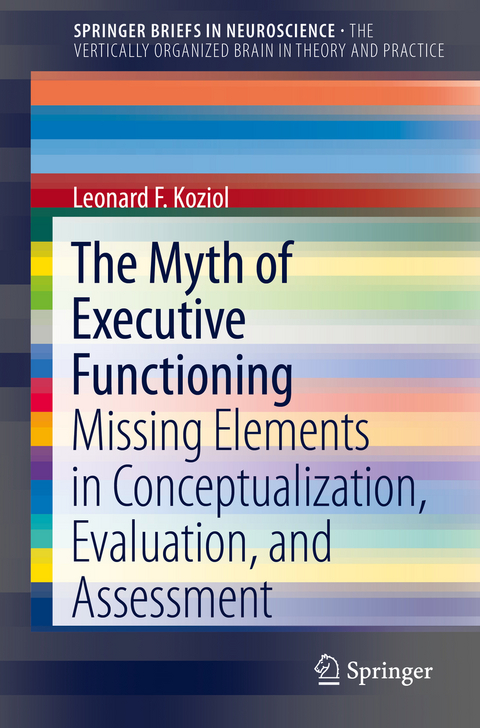
The Myth of Executive Functioning
Springer International Publishing (Verlag)
978-3-319-04476-7 (ISBN)
Executive functioning: we measure it, assess it, document its development in youth, track its decline in age and use it as a basis for diagnoses, treatment planning and-of course-theories. Could it be possible that science has spent decades chasing a cognitive phantom?
Noting the lack of consensus concerning definition, component skills, and location within the brain, The Myth of Executive Functioning calls basic assumptions, prominent theories, commonly used test methods, and even the phrase executive functioning into question. The book's deceptively simple argument takes an evolutionary/neuroscience look at the cornerstones of cognitive organization, including memory, planning, decision-making and adaptation to novel circumstances. From there, gaps are identified between systems of cognitive control and those behaviors that are evaluated in neuropsychological testing-gaps that contribute to the disconnect between how science views mind and body, brain and behavior. The author's problem-solving metaphor places new emphasis on stimulus processing and on the relationship between movement and thought as he offers thought-provoking perspectives on:
The limits of neuropsychological constructs.
- The components of adaptive thinking.
- The automatic aspects of problem solving.
- The left-brain/right-brain dichotomy.
- Problems with the domain approach to cognition.
- New paradigms for testing cognitive functioning.
A controversial presentation with the potential to change clinical practice and training, The Myth of Executive Functioning will be read, debated and learned from by neuropsychologists, clinical psychologists, psychiatrists, cognitive neuroscientists and rehabilitation specialists.
Leonard F. Koziol is a clinical neuropsychologist with specialty board certifications in neuropsychology and pediatric neuropsychology and a recognized expert in executive function disorders. His neuropsychology practice is located in Arlington Heights, Illinois where he works with children, adolescents and adults with attention or concentration problems, memory difficulties, executive dysfunction and learning disabilities both in clinical and school settings. He has been a clinical advocate for children by arguing for the development of a diagnostic nomenclature that addresses the specific problems of children. He has served as a guest editor and contributor to special edition journals on the topics of ADHD, executive functions and the role of the cerebellum in movement and thinking.
Introduction.- Problem Solving: Practical Examples and Additional Properties.- The Problem Solving Metaphor, Neuropsychology, and Exective Functioning.- Neuropsychological Constructs, Assumptions, and Executive Functioning: Revisiting Principles of Brain Organization.- Functional Domains, Unitary Constructs, and the Intergrated Brain.- Large Scale Brain Systems.- The Application of Large Scale Brain Systems to Practical "EF" Behavior: Revisting the Introductory Examples.- The Novelty -Routinization Principle of Brain Organization.- Clues to Understanding the Phylogeny of Behavioral Control.- Ways of Generating Behavior.- Movement, Thinking, Anticipation, and Banishing Exectuvie Functioning.- The Four Steps of the Development of the Cognitive Control System.- Abolishing the Executive and the Mind-Body Problem.- Why Cognitive Control is an Expansion of Cortical-Cerebellar and Cortical-Basal Ganglia Motor Control Systems.- The Cerebro-Cerebellar Underpinning of Cognitive Control.- Structure and Function of the Cerebro-Cerebellar Circuitary System.- The Basal Ganglia Underpinning of Cognitive Control: The Fronto-Striatal System.- Cognitive Control, Reward, and the Basal Ganglia.- Basal Ganglia Dynamics, Cognition, and Social Behavior.- Interim Summary.- How Well Do These Principles "FIT" Exceptional Cases?.- Why People Who Cannot Move Are Aable to Think.- The Exceptionality of the Congenitally Blind.- The Exceptionality of Deafness.- NEeuropsychological Testing and Neuropsychological Evaluation: Is There A Difference Between These Aprroaches?.- Missing Elements in the Neuropsychological Assessment of EF.- The Tradtional Neuropsychological Assessment Paradigm.- The Motor Examination.- The Evaluation of Reward Preferences.- Summary, Conclusions, and Future Directions.
| Erscheint lt. Verlag | 18.3.2014 |
|---|---|
| Reihe/Serie | SpringerBriefs in Neuroscience | The Vertically Organized Brain in Theory and Practice |
| Zusatzinfo | XI, 127 p. 5 illus. |
| Verlagsort | Cham |
| Sprache | englisch |
| Maße | 155 x 235 mm |
| Gewicht | 225 g |
| Themenwelt | Geisteswissenschaften ► Psychologie ► Biopsychologie / Neurowissenschaften |
| Medizin / Pharmazie ► Studium | |
| Schlagworte | Brain-behavior relationship • Executive functioning • integrated brain • novelty-routinization principle of brain organizat • novelty-routinization principle of brain organization • Rehabilitation • traditional vs non-traditional neuropsychology • vertically organized brain |
| ISBN-10 | 3-319-04476-1 / 3319044761 |
| ISBN-13 | 978-3-319-04476-7 / 9783319044767 |
| Zustand | Neuware |
| Informationen gemäß Produktsicherheitsverordnung (GPSR) | |
| Haben Sie eine Frage zum Produkt? |
aus dem Bereich


